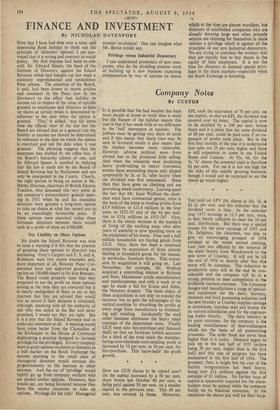FINANCE AND INVESTMENT
By NICHOLAS DAVENPORT
Now that I have had time over a rainy and depressing Bank holiday to think out the principle of 'directors' options' I am con- vinced that it is wrong and contrary to social policy. My first impulse had been to side with Sir Edward Spears, the head of the Institute of Directors, against the Inland Revenue which had handed out last week a curiously unprofessional and tendentious Press release. The attention of the Board, it said, had been drawn to recent articles and comment in the Press (not in the Spectator) to the effect that liability to income tax in respect of the value of options granted to employees and directors to take up shares at certain prices is determined by reference to the date when the option is granted. 'This,'- it added, 'was for some time the official view of the law but the Board are advised that as a general rule the liability to income tax should be determined by reference to the date on which the option is exercised and not the date when it was granted.' The phrasing suggests that the statement was drafted by the office boy, if the Board's hierarchy admits of one, and Sir Edward Spears is justified in replying that the law is made not by the Board of Inland Revenue but by Parliament and can only be interpreted in the Courts. Clearly, the right person to bring an action is Mr. Harley Drayton, chairman of British Electric Traction, who discussed this very point at the company's extraordinary general meet- ing in 1951 when he and his executive directors were granted a long-term option to take up shares at what has turned out to be an exceedingly favourable price. If these options were exercised today these fortunate directors between them would cash in a profit of close on £500,000.
Tax Liability on Share Options No doubt the Inland Revenue was wise to issue a warning if it felt that the practice of granting share options to directors was increasing. Gray's Carpets and E. S. and A. Robinson were two recent examples and, most important of all, Bowater Paper Cor- poration have just approved granting an option on 150,000 shares to Sir Eric Bowater. The Board could properly state that they proposed to tax the profit on these options arising at the time they are exercised but it is clearly undignified of them to say at this juncture that they are advised they would win an action if their decision is contested, although, speaking with all the authority of one who was called to the Bar and never practised, I would say they are right. But it is a pity that the Inland Revenue had to make any statement at all. A Warning would have come better from the Chancellor of the Exchequer in the House of Commons deprecating a practice designed to increase privilege for the privileged. If every company were to grant options on shares to directors in a bull market on the Stock Exchange the income accruing to the small class of managerial directors would increase dis- proportionately to the increase in other incomes. And the cry of 'privilege' would rightly go up from company workers who are denied similar options. Directors, they would say, are being favoured because they have the money resources to take up options. Privilege for the rich! Managerial counter revolution! One can imagine what Mr. Bevan would say.
Privilege versus Industrial Democracy I can understand promoters of new com- panies, who do the plodding creative work of building up a new business expecting compensation by way of options on shares which at the time are almost worthless, but directors of established companies who are already drawing large and often princely salaries are claiming for themselves in share options a privilege which is against all the principles of our new industrial democracy. We are trying to convince the workers that they are equally free to buy shares in the equity of their employers. It is not the time for directors to demand special privi- leges in the share markets—especially when the Stock Exchange is booming.


































 Previous page
Previous page